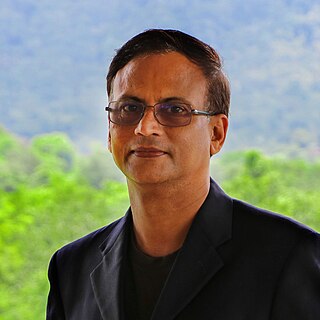Related Research Articles
Hinduism is an Indian religion and dharma, or way of life. It is the world's third-largest religion, with over 1.2 billion followers, or 15–16% of the global population, known as Hindus. The word Hindu is an exonym, and while Hinduism has been called the oldest religion in the world, many practitioners refer to their religion as Sanātana Dharma, which refers to the idea that its origins lie beyond human history, as revealed in the Hindu texts. Another, though less fitting, self-designation is Vaidika dharma, the 'dharma related to the Vedas.'

Hindus are persons who regard themselves as culturally, ethnically, or religiously adhering to aspects of Hinduism. Historically, the term has also been used as a geographical, cultural, and later religious identifier for people living in the Indian subcontinent.
Hindutva (transl. Hinduness) is the predominant form of Hindu Nationalism in India. As a political ideology, Hindutva was articulated by Vinayak Damodar Savarkar in 1923. It is championed by the Hindu Nationalist volunteer organisation Rashtriya Swayamsevak Sangh (RSS), the Vishva Hindu Parishad (VHP), the Bharatiya Janata Party (BJP) and other organisations, collectively called the Sangh Parivar. The Hindutva movement has been described as a variant of "right-wing extremism" and as "almost fascist in the classical sense", adhering to a concept of homogenised majority and cultural hegemony. Some analysts dispute the "fascist" label, and suggest Hindutva is an extreme form of "conservatism" or "ethnic absolutism".
Religious nationalism is the relationship of nationalism to a particular religious belief, dogma, or affiliation. This relationship can be broken down into two aspects: the politicization of religion and the influence of religion on politics.

Murti is a general term for an image, statue or idol of a deity or mortal in Hindu culture. In Hindu temples, it is a symbolic icon. A murti is itself not a god in Hinduism, but it is a shape, embodiment or manifestation of a deity. Murti are also found in some nontheistic Jainism traditions, where they serve as symbols of revered mortals inside Jain temples, and are worshiped in murtipujaka rituals.
Hindu law, as a historical term, refers to the code of laws applied to Hindus, Buddhists, Jains and Sikhs in British India. Hindu law, in modern scholarship, also refers to the legal theory, jurisprudence and philosophical reflections on the nature of law discovered in ancient and medieval era Indian texts. It is one of the oldest known jurisprudence theories in the world.

The Hindu American Foundation is a Hindu American advocacy group founded on September 3, 2003 and headquartered on Capitol Hill in Washington, D.C.. HAF is involved in the areas of human rights, civil rights and education among others.
Anekāntavāda is the Jain doctrine about metaphysical truths that emerged in ancient India. It states that the ultimate truth and reality is complex and has multiple aspects. Anekantavada has also been interpreted to mean non-absolutism, "intellectual Ahimsa", religious pluralism, as well as a rejection of fanaticism that leads to terror attacks and mass violence. Some scholars state that modern revisionism has attempted to reinterpret anekantavada with religious tolerance, openmindedness and pluralism..The word may be literally translated as “non-one-sidedness doctrine,” or “the doctrine of not-one-side.”
Diana L. Eck is a scholar of religious studies who is Professor of Comparative Religion and Indian Studies at Harvard University, as well as a former faculty dean of Lowell House and the Director of The Pluralism Project at Harvard. Among other works, she is the author of Banaras, City of Light, Darsan: Seeing the Divine Image in India, Encountering God: A Spiritual Journey from Bozeman to Banaras, and A New Religious America: How a Christian Country Became the World's Most Religiously Diverse Nation. At Harvard, she is in the Department of Sanskrit and Indian Studies, the Committee on the Study of Religion, and is also a member of the Faculty of Divinity. She has been reappointed the chair for the Committee on the Study of Religion, a position which she held from 1990 to 1998. In March 2012, Diana authored her book India: A Sacred Geography. She also served on the Humanities jury for the Infosys Prize in 2019.

Hinduism is the largest religion in India. According to the 2011 Census of India, 966.3 million people identify as Hindu, representing 79.8% of the country's population. India contains 94% of the global Hindu population, the world's largest Hindu population. Islam is followed by 14.2% of the population, with the remaining 6% adhering to other religions or having no religion. The vast majority of Hindus in India belong to Shaivite and Vaishnavite denominations. India is one of the three countries in the world where Hinduism is the dominant religion.
Jainism is a religion founded in ancient India. Jains trace their history through twenty-four tirthankara and revere Rishabhanatha as the first tirthankara. Some artifacts found in the Indus Valley civilization have been suggested as a link to ancient Jain culture, but very little is known about the Indus Valley iconography and script. The last two tirthankara, the 23rd tirthankara Parshvanatha and the 24th tirthankara Mahavira are considered historical figures. Mahavira was a contemporary of the Buddha. According to Jain texts, the 22nd Tirthankara Neminatha lived about 85,000 years ago and was the cousin of Krishna. Jains consider their religion eternal.

The Vishva Hindu Parishad (VHP) is an Indian right-wing Hindu organization based on Hindu nationalism. The VHP was founded in 1964 by M. S. Golwalkar and S. S. Apte in collaboration with Swami Chinmayananda. Its stated objective is "to organise, consolidate the Hindu society and to serve and protect the Hindu Dharma". It was established to construct and renovate Hindu temples, and deal with matters of cow slaughter and religious conversion.
Meera Nanda is an Indian writer and historian of science, who has authored several works critiquing the influence of Hindutva, postcolonialism and postmodernism on science, and the flourishing of pseudoscience and vedic science. She currently is a visiting faculty of humanities and social sciences at IISER Pune.
Hindu nationalism has been collectively referred to as the expression of social and political thought, based on the native spiritual and cultural traditions of the Indian subcontinent. Defenders of Hindu nationalism have tried to avoid the label "nationalism" by arguing that the use of the term "Hindu nationalism" to refer to Hindū rāṣṭravāda is a simplistic translation and is better described by the term "Hindu polity".
Pravrajika Vrajaprana is a writer on Vedanta, the history and growth of the Vedanta Societies and a nun at the Vedanta Society of Southern California's Sarada Convent. She is also a well known speaker and scholar on Hinduism and has given talks at several universities and interfaith gatherings. Her works on Vedanta include, Vedanta: A Simple Introduction (1999), editor of Living Wisdom (1994). She is the co-author, with Swami Tyagananda, of Interpreting Ramakrishna: Kali's Child Revisited (2010).

Neo-Vedanta, also called Hindu modernism, neo-Hinduism, Global Hinduism and Hindu Universalism, are terms to characterize interpretations of Hinduism that developed in the 19th century. The term "Neo-Vedanta" was coined by German Indologist Paul Hacker, in a pejorative way, to distinguish modern developments from "traditional" Advaita Vedanta.
Jainism and Hinduism are two ancient Indian religions. There are some similarities and differences between the two religions. Temples, gods, rituals, fasts and other religious components of Jainism are different from those of Hinduism.

Infinite Paths to Infinite Reality: Sri Ramakrishna & Cross-Cultural Philosophy of Religion is a book by Ayon Maharaj on Sri Ramakrishna and the philosophy of religion. The book was published in the US and UK in 2018 in hardcover. An Indian hardcover edition was published in 2019. The book has been reviewed in professional and popular journals. The author, Ayon Maharaj, holds a doctorate in philosophy from the University of California, Berkeley, is a professor at Ramakrishna Mission Vivekananda University, and was a monk-in-training when he wrote the book. He is now a fully ordained monk with the name Swami Medhananda.

Pankaj Jain is a professor of Philosophy, Religious Studies, Film Studies, Sustainability, and Diaspora Studies. He has authored three books and has coedited the Hinduism Section of the Encyclopedia of Indian Religions. His articles have appeared in multiple academic journals and popular websites. In July 2020, The New York Times interviewed him, and in 2019, Morgan Freeman interviewed him in his National Geographic series The Story of God.
Lawrence Alan Babb is the Willem Schupf Professor of Asian Languages & Civilizations and an Emeritus Professor of Anthropology, Amherst College, Massachusetts. He specializes in Indian civilization, and Asian Religion and Society. He is an author of numerous books on rituals, caste system, myths, beliefs and ritual practices in South Asian society and religions.
References
- 1 2 "Elizabethtown College -Directory". Archived from the original on May 28, 2010. Retrieved April 28, 2009.
- ↑ Long, Jeffery D. (January 23, 2007). "Introduction". A Vision for Hinduism: Beyond Hindu Nationalism. I.B.Tauris. ISBN 9781845112738 – via Google Books.
- ↑ Long, Jeffery D. (2000). Plurality and relativity: Whitehead, Jainism, and the reconstruction of religious pluralism (PhD thesis). University of Chicago.
- ↑ "Know Thy Neighbor: Cultivating a Community of Respect (talk announcement)". Township of Derry, Hershey PA. March 19, 2018. Retrieved October 14, 2020.
- ↑ "2017 Surjit Singh Lecture (announcement)". Graduate Theological Union. February 22, 2017. Retrieved October 17, 2020.
- ↑ "California textbook controversy over Hindu history". Archived from the original on October 18, 2006.CS1 maint: unfit URL (link)
- ↑ "Hindu American Foundation holds gala, policy conference in Washington, D.C." News India Times. June 24, 2018. Archived from the original on October 12, 2020. Retrieved October 12, 2020.
- ↑ Gough, Ellen (March 2010). Religious Studies Review . 36 (1): 97. doi:10.1111/j.1748-0922.2010.01412_4.x.CS1 maint: untitled periodical (link)